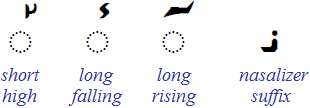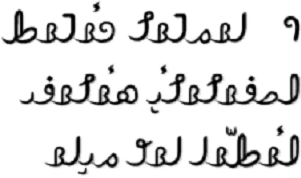This script was created by Maulana Hanif in the 1980s for writing Rohingya, a language descended from Magadha Prakrit, and spoken by the Rohingya people of Myanmar and Bangladesh. It has some ideas from Arabic (which has also been used for writing Rohingya) and is written right-to-left. I think it is one of the most attractive invented scripts for a living language in recent times. Thanks to Mattias Persson for finding this script, and to Anshuman Pandey for sharing his developing Unicode proposal of it.
The Alphabet
The script represents consonants and vowels in linear series, with floating diacritics used as modifiers. The letters are not written in a fully cursive fashion, but they touch, and this gives an appearance similar to Arabic. There is also some similarity to the African invented script N’ko.
Fonts used here were designed by Muhammad Noor and are available from the OpenFontLibrary: the bold Kuna and the light, flowing Gonya.
Consonants
Several letters bear resemblance to Arabic letters. The first letter is used like Arabic alif to carry an initial vowel. The last symbol is used like Arabic shadda above a consonant to show doubling.
Vowels and vowel modifiers
Consonants are followed by one (or two) of the following vowels. For a final vowel-less consonant, the sakin no-vowel may be written.
Tone-marks hover above their vowel(s), and a vowel-nasalizer may follow a vowel or vowels.
Numerals
The numerals are written left to right, as in Arabic.
Examples
1. This a hand-written sample appearing in the language primer Kayda Ruwainggya Zubanor.
2. This from a video by Muhammad Noor, as quoted in Anshuman Pandey’s document.






